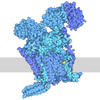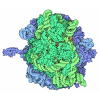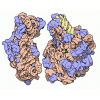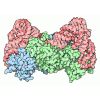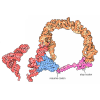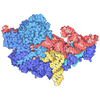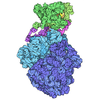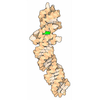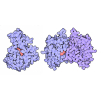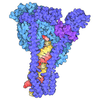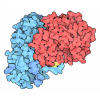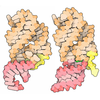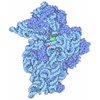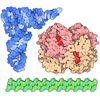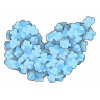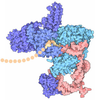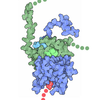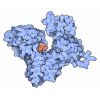+ Open data
Open data
- Basic information
Basic information
| Entry | Database: PDB / ID: 7qwq | ||||||
|---|---|---|---|---|---|---|---|
| Title | Ternary complex of ribosome nascent chain with SRP and NAC | ||||||
 Components Components |
| ||||||
 Keywords Keywords | RIBOSOME / SRP / NAC / nascent chain / co-translational / Endoplasmic reticulum / co-translational protein targeting / co-translational folding | ||||||
| Function / homology |  Function and homology information Function and homology informationPI3K Cascade / PIP3 activates AKT signaling / FLT3 Signaling / Negative regulation of FLT3 / FLT3 signaling through SRC family kinases / RAF/MAP kinase cascade / negative regulation of protein localization to endoplasmic reticulum / nascent polypeptide-associated complex / regulation of skeletal muscle fiber development / negative regulation of striated muscle cell apoptotic process ...PI3K Cascade / PIP3 activates AKT signaling / FLT3 Signaling / Negative regulation of FLT3 / FLT3 signaling through SRC family kinases / RAF/MAP kinase cascade / negative regulation of protein localization to endoplasmic reticulum / nascent polypeptide-associated complex / regulation of skeletal muscle fiber development / negative regulation of striated muscle cell apoptotic process / positive regulation of cell proliferation involved in heart morphogenesis / SRP-dependent cotranslational protein targeting to membrane, signal sequence recognition / PI5P, PP2A and IER3 Regulate PI3K/AKT Signaling / signal recognition particle, endoplasmic reticulum targeting / positive regulation of skeletal muscle tissue growth / Major pathway of rRNA processing in the nucleolus and cytosol / GTP hydrolysis and joining of the 60S ribosomal subunit / cardiac ventricle development / granulocyte differentiation / L13a-mediated translational silencing of Ceruloplasmin expression / SRP-dependent cotranslational protein targeting to membrane / Formation of a pool of free 40S subunits / Nonsense Mediated Decay (NMD) independent of the Exon Junction Complex (EJC) / Nonsense Mediated Decay (NMD) enhanced by the Exon Junction Complex (EJC) / signal recognition particle binding / signal recognition particle / cotranslational protein targeting to membrane / endoplasmic reticulum signal peptide binding / signal-recognition-particle GTPase / protein targeting to ER / skeletal muscle tissue regeneration / heart trabecula morphogenesis / SRP-dependent cotranslational protein targeting to membrane / 7S RNA binding / exocrine pancreas development / SRP-dependent cotranslational protein targeting to membrane, translocation / protein targeting to membrane / embryonic hemopoiesis / regulation of G1 to G0 transition / exit from mitosis / positive regulation of intrinsic apoptotic signaling pathway in response to DNA damage by p53 class mediator / regulation of translation involved in cellular response to UV / protein-DNA complex disassembly / positive regulation of DNA damage response, signal transduction by p53 class mediator resulting in transcription of p21 class mediator / optic nerve development / retinal ganglion cell axon guidance / G1 to G0 transition / positive regulation of signal transduction by p53 class mediator / ubiquitin ligase inhibitor activity / SRP-dependent cotranslational protein targeting to membrane / cellular response to actinomycin D / ribonucleoprotein complex binding / rough endoplasmic reticulum / DNA damage response, signal transduction by p53 class mediator resulting in cell cycle arrest / negative regulation of ubiquitin-dependent protein catabolic process / neutrophil chemotaxis / maturation of LSU-rRNA from tricistronic rRNA transcript (SSU-rRNA, 5.8S rRNA, LSU-rRNA) / maturation of LSU-rRNA / ribosomal large subunit biogenesis / cytokine activity / positive regulation of translation / wound healing / cellular response to gamma radiation / receptor tyrosine kinase binding / mRNA 5'-UTR binding / transcription coactivator binding / rRNA processing / antimicrobial humoral immune response mediated by antimicrobial peptide / GDP binding / unfolded protein binding / protein transport / retina development in camera-type eye / regulation of translation / 5S rRNA binding / large ribosomal subunit rRNA binding / defense response to Gram-negative bacterium / in utero embryonic development / killing of cells of another organism / cytosolic large ribosomal subunit / tRNA binding / cytoplasmic translation / transcription coactivator activity / postsynaptic density / nuclear body / protein stabilization / rRNA binding / ribosome / nuclear speck / structural constituent of ribosome / ribonucleoprotein complex / response to xenobiotic stimulus / translation / protein domain specific binding / focal adhesion / GTPase activity / mRNA binding / ubiquitin protein ligase binding / synapse / positive regulation of cell population proliferation / positive regulation of gene expression Similarity search - Function | ||||||
| Biological species |  Homo sapiens (human) Homo sapiens (human) | ||||||
| Method | ELECTRON MICROSCOPY / single particle reconstruction / cryo EM / Resolution: 2.83 Å | ||||||
 Authors Authors | Jomaa, A. / Gamerdinger, M. / Hsieh, H. / Wallisch, A. / Chandrasekaran, V. / Ulusoy, Z. / Scaiola, A. / Hegde, R. / Shan, S. / Ban, N. / Deuerling, E. | ||||||
| Funding support |  Switzerland, 1items Switzerland, 1items
| ||||||
 Citation Citation |  Journal: Science / Year: 2022 Journal: Science / Year: 2022Title: Mechanism of signal sequence handover from NAC to SRP on ribosomes during ER-protein targeting. Authors: Ahmad Jomaa / Martin Gamerdinger / Hao-Hsuan Hsieh / Annalena Wallisch / Viswanathan Chandrasekaran / Zeynel Ulusoy / Alain Scaiola / Ramanujan S Hegde / Shu-Ou Shan / Nenad Ban / Elke Deuerling /     Abstract: The nascent polypeptide-associated complex (NAC) interacts with newly synthesized proteins at the ribosomal tunnel exit and competes with the signal recognition particle (SRP) to prevent mistargeting ...The nascent polypeptide-associated complex (NAC) interacts with newly synthesized proteins at the ribosomal tunnel exit and competes with the signal recognition particle (SRP) to prevent mistargeting of cytosolic and mitochondrial polypeptides to the endoplasmic reticulum (ER). How NAC antagonizes SRP and how this is overcome by ER targeting signals are unknown. Here, we found that NAC uses two domains with opposing effects to control SRP access. The core globular domain prevented SRP from binding to signal-less ribosomes, whereas a flexibly attached domain transiently captured SRP to permit scanning of nascent chains. The emergence of an ER-targeting signal destabilized NAC's globular domain and facilitated SRP access to the nascent chain. These findings elucidate how NAC hands over the signal sequence to SRP and imparts specificity of protein localization. | ||||||
| History |
|
- Structure visualization
Structure visualization
| Movie |
 Movie viewer Movie viewer |
|---|---|
| Structure viewer | Molecule:  Molmil Molmil Jmol/JSmol Jmol/JSmol |
- Downloads & links
Downloads & links
- Download
Download
| PDBx/mmCIF format |  7qwq.cif.gz 7qwq.cif.gz | 3.1 MB | Display |  PDBx/mmCIF format PDBx/mmCIF format |
|---|---|---|---|---|
| PDB format |  pdb7qwq.ent.gz pdb7qwq.ent.gz | Display |  PDB format PDB format | |
| PDBx/mmJSON format |  7qwq.json.gz 7qwq.json.gz | Tree view |  PDBx/mmJSON format PDBx/mmJSON format | |
| Others |  Other downloads Other downloads |
-Validation report
| Summary document |  7qwq_validation.pdf.gz 7qwq_validation.pdf.gz | 1.6 MB | Display |  wwPDB validaton report wwPDB validaton report |
|---|---|---|---|---|
| Full document |  7qwq_full_validation.pdf.gz 7qwq_full_validation.pdf.gz | 1.6 MB | Display | |
| Data in XML |  7qwq_validation.xml.gz 7qwq_validation.xml.gz | 219.5 KB | Display | |
| Data in CIF |  7qwq_validation.cif.gz 7qwq_validation.cif.gz | 379.4 KB | Display | |
| Arichive directory |  https://data.pdbj.org/pub/pdb/validation_reports/qw/7qwq https://data.pdbj.org/pub/pdb/validation_reports/qw/7qwq ftp://data.pdbj.org/pub/pdb/validation_reports/qw/7qwq ftp://data.pdbj.org/pub/pdb/validation_reports/qw/7qwq | HTTPS FTP |
-Related structure data
| Related structure data |  14191MC  7qwrC  7qwsC M: map data used to model this data C: citing same article ( |
|---|---|
| Similar structure data |
- Links
Links
- Assembly
Assembly
| Deposited unit | 
|
|---|---|
| 1 |
|
- Components
Components
-RNA chain , 4 types, 4 molecules 1578
| #1: RNA chain | Mass: 54095.184 Da / Num. of mol.: 1 Source method: isolated from a genetically manipulated source Source: (gene. exp.)  Homo sapiens (human) / Production host: Homo sapiens (human) / Production host:  |
|---|---|
| #9: RNA chain | Mass: 1539032.000 Da / Num. of mol.: 1 / Source method: isolated from a natural source / Source: (natural)  |
| #47: RNA chain | Mass: 38691.914 Da / Num. of mol.: 1 / Source method: isolated from a natural source / Source: (natural)  |
| #49: RNA chain | Mass: 50143.648 Da / Num. of mol.: 1 / Source method: isolated from a natural source / Source: (natural)  |
-Signal recognition particle ... , 3 types, 3 molecules qvx
| #2: Protein | Mass: 16183.746 Da / Num. of mol.: 1 Source method: isolated from a genetically manipulated source Source: (gene. exp.)  Homo sapiens (human) / Gene: SRP19 / Production host: Homo sapiens (human) / Gene: SRP19 / Production host:  |
|---|---|
| #5: Protein | Mass: 70831.578 Da / Num. of mol.: 1 Source method: isolated from a genetically manipulated source Source: (gene. exp.)  Homo sapiens (human) / Gene: SRP68 / Production host: Homo sapiens (human) / Gene: SRP68 / Production host:  |
| #6: Protein | Mass: 55847.734 Da / Num. of mol.: 1 Source method: isolated from a genetically manipulated source Details: mutant G226E / Source: (gene. exp.)  Homo sapiens (human) / Gene: SRP54 / Production host: Homo sapiens (human) / Gene: SRP54 / Production host:  References: UniProt: P61011, Hydrolases; Acting on acid anhydrides; Acting on GTP to facilitate cellular and subcellular movement |
-Protein , 12 types, 12 molecules suABDFmopQXt
| #3: Protein | Mass: 9549.763 Da / Num. of mol.: 1 Source method: isolated from a genetically manipulated source Details: this will need to changed to UNK / Source: (gene. exp.)  Homo sapiens (human) / Production host: Homo sapiens (human) / Production host:  |
|---|---|
| #4: Protein | Mass: 17724.037 Da / Num. of mol.: 1 Source method: isolated from a genetically manipulated source Source: (gene. exp.)  Homo sapiens (human) / Gene: BTF3, NACB, OK/SW-cl.8 / Production host: Homo sapiens (human) / Gene: BTF3, NACB, OK/SW-cl.8 / Production host:  |
| #7: Protein | Mass: 26570.105 Da / Num. of mol.: 1 / Source method: isolated from a natural source / Source: (natural)  |
| #10: Protein | Mass: 46107.977 Da / Num. of mol.: 1 Source method: isolated from a genetically manipulated source Source: (gene. exp.)  Homo sapiens (human) / Production host: Homo sapiens (human) / Production host:  |
| #14: Protein | Mass: 34481.828 Da / Num. of mol.: 1 / Source method: isolated from a natural source / Source: (natural)  |
| #18: Protein | Mass: 26662.787 Da / Num. of mol.: 1 / Source method: isolated from a natural source / Source: (natural)  |
| #31: Protein | Mass: 14758.394 Da / Num. of mol.: 1 / Source method: isolated from a natural source / Source: (natural)  |
| #35: Protein | Mass: 16130.169 Da / Num. of mol.: 1 / Source method: isolated from a natural source / Source: (natural)  |
| #37: Protein | Mass: 10299.350 Da / Num. of mol.: 1 / Source method: isolated from a natural source / Source: (natural)  |
| #38: Protein | Mass: 21457.391 Da / Num. of mol.: 1 / Source method: isolated from a natural source / Source: (natural)  |
| #46: Protein | Mass: 17768.246 Da / Num. of mol.: 1 / Source method: isolated from a natural source / Source: (natural)  |
| #52: Protein | Mass: 23406.824 Da / Num. of mol.: 1 Source method: isolated from a genetically manipulated source Source: (gene. exp.)  Homo sapiens (human) / Gene: NACA, HSD48 / Production host: Homo sapiens (human) / Gene: NACA, HSD48 / Production host:  |
+60S ribosomal protein ... , 23 types, 23 molecules bcCEfgGhHiIkLMnOPrRSTZa
-Ribosomal protein ... , 10 types, 10 molecules dejJlNUVWY
| #13: Protein | Mass: 14494.938 Da / Num. of mol.: 1 / Source method: isolated from a natural source / Source: (natural)  |
|---|---|
| #15: Protein | Mass: 18350.049 Da / Num. of mol.: 1 / Source method: isolated from a natural source / Source: (natural)  |
| #25: Protein | Mass: 11111.032 Da / Num. of mol.: 1 / Source method: isolated from a natural source / Source: (natural)  |
| #26: Protein | Mass: 20288.465 Da / Num. of mol.: 1 / Source method: isolated from a natural source / Source: (natural)  |
| #29: Protein | Mass: 6426.759 Da / Num. of mol.: 1 / Source method: isolated from a natural source / Source: (natural)  |
| #32: Protein | Mass: 24207.285 Da / Num. of mol.: 1 / Source method: isolated from a natural source / Source: (natural)  |
| #43: Protein | Mass: 11836.638 Da / Num. of mol.: 1 / Source method: isolated from a natural source / Source: (natural)  |
| #44: Protein | Mass: 14892.505 Da / Num. of mol.: 1 / Source method: isolated from a natural source / Source: (natural)  |
| #45: Protein | Mass: 17825.111 Da / Num. of mol.: 1 / Source method: isolated from a natural source / Source: (natural)  |
| #48: Protein | Mass: 17303.363 Da / Num. of mol.: 1 / Source method: isolated from a natural source / Source: (natural)  |
-Non-polymers , 2 types, 102 molecules 


| #53: Chemical | ChemComp-MG / #54: Chemical | ChemComp-ZN / |
|---|
-Details
| Has ligand of interest | N |
|---|
-Experimental details
-Experiment
| Experiment | Method: ELECTRON MICROSCOPY |
|---|---|
| EM experiment | Aggregation state: PARTICLE / 3D reconstruction method: single particle reconstruction |
- Sample preparation
Sample preparation
| Component |
| ||||||||||||||||||||||||||||||||||||||||||
|---|---|---|---|---|---|---|---|---|---|---|---|---|---|---|---|---|---|---|---|---|---|---|---|---|---|---|---|---|---|---|---|---|---|---|---|---|---|---|---|---|---|---|---|
| Source (natural) |
| ||||||||||||||||||||||||||||||||||||||||||
| Source (recombinant) |
| ||||||||||||||||||||||||||||||||||||||||||
| Buffer solution | pH: 7.5 | ||||||||||||||||||||||||||||||||||||||||||
| Specimen | Embedding applied: NO / Shadowing applied: NO / Staining applied: NO / Vitrification applied: YES | ||||||||||||||||||||||||||||||||||||||||||
| Specimen support | Grid material: COPPER / Grid type: Quantifoil R2/2 | ||||||||||||||||||||||||||||||||||||||||||
| Vitrification | Instrument: FEI VITROBOT MARK IV / Cryogen name: ETHANE-PROPANE / Humidity: 95 % |
- Electron microscopy imaging
Electron microscopy imaging
| Experimental equipment |  Model: Titan Krios / Image courtesy: FEI Company |
|---|---|
| Microscopy | Model: FEI TITAN KRIOS |
| Electron gun | Electron source:  FIELD EMISSION GUN / Accelerating voltage: 300 kV / Illumination mode: FLOOD BEAM FIELD EMISSION GUN / Accelerating voltage: 300 kV / Illumination mode: FLOOD BEAM |
| Electron lens | Mode: BRIGHT FIELD / Nominal defocus max: 3000 nm / Nominal defocus min: 1000 nm |
| Specimen holder | Cryogen: NITROGEN / Specimen holder model: FEI TITAN KRIOS AUTOGRID HOLDER |
| Image recording | Electron dose: 50 e/Å2 / Film or detector model: GATAN K3 (6k x 4k) |
- Processing
Processing
| CTF correction | Type: PHASE FLIPPING AND AMPLITUDE CORRECTION |
|---|---|
| 3D reconstruction | Resolution: 2.83 Å / Resolution method: FSC 0.143 CUT-OFF / Num. of particles: 51843 / Symmetry type: POINT |
 Movie
Movie Controller
Controller






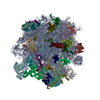

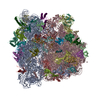
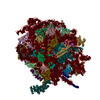

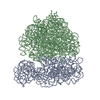



 PDBj
PDBj